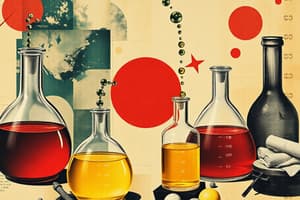Podcast
Questions and Answers
What are the characteristics of acids?
What are the characteristics of acids?
- Slippery
- Sour (correct)
- pH less than 7 (correct)
- Bitter
What are the characteristics of bases?
What are the characteristics of bases?
- Sour
- Bitter (correct)
- Squeaky
- pH greater than 7 (correct)
What is HCl?
What is HCl?
Hydrochloric acid
What is HC2H3O2?
What is HC2H3O2?
What is H2SO4?
What is H2SO4?
What is HNO2?
What is HNO2?
What is HNO3?
What is HNO3?
What is H3PO4?
What is H3PO4?
What is HBr?
What is HBr?
What is H2SO3?
What is H2SO3?
What does the suffix 'ate-', 'ite', 'ide-' correspond to?
What does the suffix 'ate-', 'ite', 'ide-' correspond to?
What are the products of the self-ionization of water?
What are the products of the self-ionization of water?
What is the degree or amount of ionization for a strong acid?
What is the degree or amount of ionization for a strong acid?
Are strong acids/bases strong or weak electrolytes?
Are strong acids/bases strong or weak electrolytes?
Classify the following: KOH, Ca(OH)2, HCl, H2SO4, NH3, HC2H3O2.
Classify the following: KOH, Ca(OH)2, HCl, H2SO4, NH3, HC2H3O2.
What does the Arrhenius Theory state?
What does the Arrhenius Theory state?
What is the Bronsted-Lowry definition of acids and bases?
What is the Bronsted-Lowry definition of acids and bases?
In the reaction HCl + H2O, what is the acid and its conjugate base?
In the reaction HCl + H2O, what is the acid and its conjugate base?
In the reaction HCl + H2O, what is the base and its conjugate acid?
In the reaction HCl + H2O, what is the base and its conjugate acid?
Differentiate between strong vs. weak and concentrated vs. dilute solutions.
Differentiate between strong vs. weak and concentrated vs. dilute solutions.
What is a Lewis acid?
What is a Lewis acid?
What is a Lewis base?
What is a Lewis base?
What is a neutralization reaction?
What is a neutralization reaction?
What type of reaction involves an acid-base titration?
What type of reaction involves an acid-base titration?
What indicates an acidic solution?
What indicates an acidic solution?
What indicates an alkaline solution?
What indicates an alkaline solution?
What is pH?
What is pH?
What relative to hydroxide determines a solution's pH?
What relative to hydroxide determines a solution's pH?
What is a hydroxide ion?
What is a hydroxide ion?
What is amphoteric?
What is amphoteric?
What is a neutralization reaction?
What is a neutralization reaction?
What is titration?
What is titration?
What changes color in acidic and basic solutions?
What changes color in acidic and basic solutions?
When acids react with active metals, what gas is released?
When acids react with active metals, what gas is released?
In a neutral solution, what equals $1.0 imes 10^{-7}$?
In a neutral solution, what equals $1.0 imes 10^{-7}$?
Flashcards are hidden until you start studying
Study Notes
Characteristics of Acids and Bases
- Acids: sour taste, pH less than 7, conduct electricity, have a squeaky feel.
- Bases: bitter taste, pH greater than 7, conduct electricity, feel slippery.
Common Acids
- HCl: Hydrochloric acid, commonly found in stomach acid.
- HC2H3O2: Acetic acid, a component of vinegar.
- H2SO4: Sulfuric acid, used in batteries and industrial processes.
- HNO2: Nitrous acid, often used in food preservation.
- HNO3: Nitric acid, a strong oxidizing agent.
- H3PO4: Phosphoric acid, used in fertilizers and food flavoring.
- HBr: Hydrobromic acid, used in metal processing.
- H2SO3: Sulfurous acid, formed when sulfur dioxide dissolves in water.
Ionization and Electrolytes
- Self-ionization of water produces hydroxide ions (OH⁻) and hydronium ions (H₃O⁺).
- Strong acids/bases fully ionize in solution, categorized as strong electrolytes.
- Weak acids/bases partially ionize in solution and are weak electrolytes.
Acid-Base Theories
- Arrhenius Theory: Acids release H⁺, bases release OH⁻; acids start with H, bases end with OH.
- Brønsted-Lowry Theory: Acids are proton donors (H⁺), bases are proton acceptors.
Acid-Base Reactions
- Neutralization reaction: An acid reacts with a base to form salt and water.
- Acid-base titration: A process of slowly adding a known concentration of titrant to a solution of unknown concentration until neutralization, typically indicated by color change.
Solution Properties
- Acidic solutions have a greater concentration of hydrogen ions than water.
- Alkaline solutions have a pH greater than 7 or a hydroxide ion concentration greater than 10⁻⁷.
- pH measures acidity or basicity of an aqueous solution.
- Hydronium ion concentration relative to hydroxide ion determines solution pH.
Important Ions
- Hydroxide ion (OH⁻): Composed of one oxygen and one hydrogen atom, negatively charged.
- Amphoteric substances can react as both acids and bases.
Indicators and Reactions
- Phenolphthalein is an acid-base indicator, turning colorless in acidic solutions and pink in basic.
- When acids react with active metals, hydrogen gas (H₂) is released.
Neutrality and Properties
- In a neutral solution, H⁺ concentration equals OH⁻ concentration, both at 1.0 x 10⁻⁷ M.
Studying That Suits You
Use AI to generate personalized quizzes and flashcards to suit your learning preferences.




